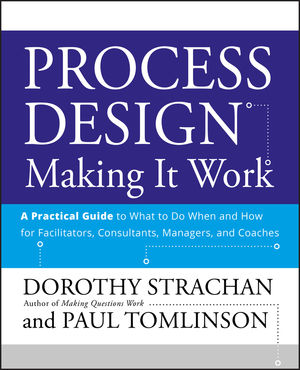Process Design: Making it Work: A Practical Guide to What to do When and How for Facilitators, Consultants, Managers and CoachesISBN: 978-0-470-18270-3
Paperback
288 pages
April 2008, Jossey-Bass
 This is a Print-on-Demand title. It will be printed specifically to fill your order. Please allow an additional 10-15 days delivery time. The book is not returnable.
|
||||||
The Authors.
Introduction.
Themes.
About the Word Process.
About Propositions.
Investing in Process Design.
PART ONE: A STEPWISE APPROACH.
1. Six Steps.
Step 1. Complete a Process Terms of Reference.
Step 2. Block the Agenda.
Step 3. Develop and Confirm How the Agenda Will Flow.
Step 4. Build a Preliminary Design.
Step 5. Check the Preliminary Design with Others.
Step 6. Complete the Design.
Propositions.
2. Guidelines For Process Design.
Make Upstream Prevention a Priority.
Curb the "Overs".
Think Strategically About Expertise.
Listen for Mental Maps.
Approach Time Consciously.
Create an Environment That Supports Learning.
Rethink Openings and Closings.
And Finally.
Propositions.
PART TWO: THE PEOPLE FACTORS: PERSPECTIVES, POWER, AND VALUES.
3. The Perspectives Factor in Process Design.
Mining Perspectives.
Group Participation Styles.
Propositions.
4. The Power Factor in Process Design.
Types of Power.
Power and Commitment.
Using Power Positively.
Propositions.
5. The Values Factor in Process Design.
About Values.
A Values Hierarchy.
Implications for Process Design.
In Summary.
Propositions.
PART THREE: DUE DILIGENCE: A PROCESS TERMS OF REFERENCE.
6. About a Process Terms of Reference.
Maps and Territories.
Developing a PTR.
A Collaborative Stance.
Practice Guidelines.
Propositions.
7. Understanding the Situation.
Sample Questions for Exploring the Situation.
Practice Guidelines: Situation.
Examples: Situation.
Propositions.
8. Developing a Focus.
Purpose.
Objectives, Outputs, and Outcomes.
Sample Questions for Developing a Purpose Statement.
Practice Guidelines: Purpose, Objectives, Outputs, and Outcomes.
Sample Questions for Developing Objectives, Outputs, and Outcomes.
Examples: Purpose, Objectives, Outputs, and Outcomes 129 Propositions.
9. Stakeholder Collaboration.
Stakeholder Perspectives and Categories.
Sample Questions for Identifying Stakeholders.
Practice Guidelines: Stakeholder Collaboration.
Examples: Key Stakeholders.
Propositions.
10. Core Assumptions.
Scope.
Sample Questions for Developing Assumptions.
Practice Guidelines: Core Assumptions.
Examples: Core Assumptions.
Propositions.
11. Key Considerations.
Sample Questions for Developing Key Considerations.
Practice Guidelines: Key Considerations.
Examples: Key Considerations.
Propositions.
12. Work Plan.
Sample Questions for Developing a Work Plan.
Practice Guidelines: Work Plan.
Example: A Simple Work Plan.
Example: A Complex Work Plan.
Propositions.
13. Governance.
Sample Questions for Developing a Governance Structure.
Practice Guidelines: Governance.
Examples: Governance Structures.
Propositions.
14. Essential Documents.
Sample Questions for Identifying and Developing Essential Documents .
Practice Guidelines: Essential Documents.
Reports.
Examples: Essential Documents.
Propositions.
15. PTR-Three Examples.
Account Planning for a Regional Sales Group.
Three Boards Speaking with One Voice.
Access to Organ Transplantation in Canada: Phase 1-Kidney Allocation.
PART FOUR : EXPERTS AND EVIDENCE IN CONCERT.
16. Why Evidence-Based Solutions Now.
Knowing What to Ask.
Why Best Evidence Is Important.
Ambiguity, Paradox, and Disagreement.
Propositions.
17. A Design for Developing Evidence-Based Questions.
Working Through the Steps.
Practice Guidelines: Question Development.
And Finally . . ..
Propositions.
PART FIVE: SAMPLE PROCESS DESIGNS.
18. A Town Hall Meeting with XYZ Finance Department.
19. A Workshop on Mission and Values.
References.



